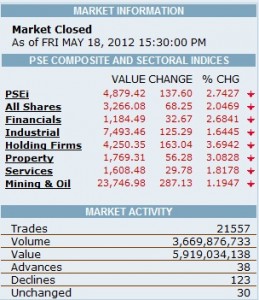PH stocks post worst week as risks of eurozone breakup escalates
MANILA, Philippines – The local stock market saw its worst performance for the year this week, giving up 5.4 percent or 278.72 points at Friday’s close as all eyes were focused on fiscal contagion that threatens to break up the eurozone.
The main-share Philippine Stock Exchange index lost 137.6 points or 2.74 percent to finish at 4,879.42 on Friday as regional markets were spooked by a credit downgrade on Spanish banks and a disappointing factory data out of the US.
“What’s key is Europe. Foreigners are selling because of the redemptions overseas so because they’re losing a lot of money in Europe, they take profits here … They have seen a lot of their profits evaporate in India. Korea is in negative territory. Japan is in negative territory,” said Carlos Jalandoni, vice president at Bank of the Philippine Islands asset management and trust group.
Because foreign investors were doing well in the Philippine market early in the year despite their relatively smaller allocation to this market, he said many were thus locking in gains because they were unsure of what lies for the rest of the year.
“So that’s driving the selling but on the flip-side, you have a lot of local funds awash with cash so they’re providing support,” Jalandoni said.
The fund manager said the recent correction was only a “temporary aberration” and a “necessary pain” but that the index would eventually recover and reach new heights of 5,500 to 5,800 later in the year.
If local funds were already fully invested in equities, he said the selldown could go all the way to 4,500. “But since there are a lot of funds looking for good play and good value and are very liquid, I think the retracement will only be until 4,700,” he said.
The worst hit counters for the day were the holding firms and property sub-indices which slumped by 3.69 percent and 3.08 percent, respectively.
Value turnover amounted to P5.92 billion. There were 38 advancers versus 123 decliners while 30 stocks were unchanged.
Among the most battered index stocks were DMCI Holdings (-4.92 percent), Ayala Land (-4.52 percent), Ayala Corp. (3.89 percent) , BPI (-3.3 percent), SM Investments (-3.3 percent) and Megaworld (-3 percent).
Investors also unloaded shares of Metrobank, PLDT, AGI, SM Prime, ICTSI, URC and SMC.
Those who cashed out of blue chips shifted to exploration firms like Philex Petroleum (+1.46 percent) and Philodrill Corp. (-2.27 percent) which were among the few that bucked the day’s bloodbath.
Jalandoni said the market’s direction in the near term would still be influenced by developments in Greece.
“If Greece departs from the eurozone, how do they contain the contagion in other markets? And that really depends on Germany. The key here is Germany,” Jalandoni said.
Despite the recent volatility, Jalandoni said what’s different this year is that all the monetary solution was in place, given the bailout package in the EU, and that the US economy had somehow stabilized.
As far as corporate Philippines was concerned, Jalandoni said the fundamentals were brighter.
For the first time in 10 months, he noted that there were upgrades in consensus earnings of listed companies. The upcoming mid-term elections in 2013 and the government’s public-private partnership programs, he added, would provide additional impetus for the market.
In a commentary, investment bank BoFA Merrill Lynch said the risk of a Greek euro exit was rising.
“The recent political paralysis has now brought Greece to what could prove to be the worst stage of its crisis. Following the failure of the elections of May 6, another election has now been called for June 17. The latest polls suggest the risks of a coalition government against the austerity program, or no agreement on a government at all, are increasing. Although polls in Greece show very strong support for the euro, we believe that the current situation could trigger a chain of events that could lead Greece to exit on its own,” BoFA Merrill Lynch said in a commentary.
But the investment bank said likewise rising were the incentives to keep Greece in. If Greece were to exit, it said the implications would be profound both for Greece and the euro zone economy. Citing International Monetary Fund figures, in the event of an exit, it said Greek GDP could contract by as much as 10 percent in the first year of exit.
“For the eurozone, we assume that a forceful set of policy measures would be implemented but they would nevertheless result in elevated costs … In addition, a Greek exit could spill over to other countries resulting in deposit flights threatening the stability of banking sectors and destabilising sovereign bond markets. As policymakers assess the effect of Greece leaving the euro, the high costs and risk of contagion will, in our view, raise the impetus to keep Greece in,” it said.

